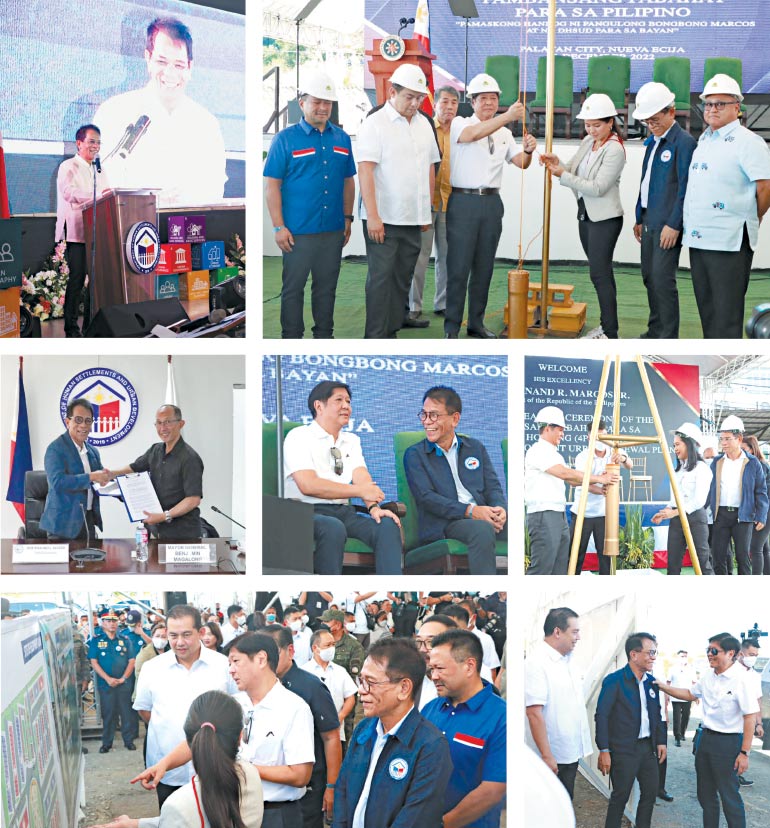Upholding inclusivity in PHL’s housing program

Commitment to housing for all avowed as DHSUD celebrates 4th anniversary
As the Philippines continues forward on its growth trajectory, a major societal problem looms larger over the horizon. Metro Manila, as it stands, is bursting at the seams.
According to government data, the country’s current housing backlog is pegged at 6.5 million units. Furthermore, this is expected to balloon at “an unprecedented proportion if usual program strategies were adopted for implementation.”
For the country’s continued growth, much has to be done to address this.
This is the reason that the Department of Human Settlements and Urban Development (DHSUD) is highlighting the inclusivity of the “Pambansang Pabahay para sa Pilipino Housing (4PH) Program” as it celebrates its 4th anniversary.
Through the 4PH, the main housing initiative of the Marcos administration, the DHSUD hopes to close the housing gap and further build sustainable housing communities.
The government’s Pambansang Pabahay program seeks to address the nation’s housing need by constructing one million homes per year until 2028. It is designed primarily to help low-income individuals and those living in informal settlements get access to and purchase a home of their own.
In order to guarantee that residents of homes will have access to a means of subsistence and other essential services, Pambansang Pabahay also examines township development.
Additionally, the DHSUD maintains its operations in order to carry out its primary purpose regarding the administration of housing, human settlements and urban development through its advisory role, regulatory functions and policy creation.
With the theme, “Tahanang sapat para sa lahat,” the DHSUD celebrates its anniversary by highlighting the goal of President Ferdinand R. Marcos, Jr.’s 4PH Program and the innovative efforts of the department in making this happen.
In barely seven months, the program has elicited positive responses and secured the overwhelming support of relevant stakeholders, which resulted in its fast rollout immediately after its launching. The President himself has expressed his full confidence on the Pambansang Pabahay, dubbing it as the solution to the country’s housing problem, if the goal to build one million housing units per year is achieved.
Catching up to the housing gap
According to historical data, the annual average housing production across the country in the past years is pegged at approximately 200,000 housing units — which is nowhere near enough to catch up to the housing backlog.
To address this, DHSUD Secretary Jose Rizalino L. Acuzar has vowed to work “five times harder” to fulfill his mission as the housing czar of this administration.
“The operations of DHSUD has always been anchored to its vision of providing adequate and affordable housing, inclusive human settlements and well-planned communities for every Filipino family. The programs in the past years were all geared toward this goal, as institutionalized in the 2040 National Housing and Urban Development Sector Plan,” the department said in an email.
“With Pambansang Pabahay at the cornerstone of this administration’s housing initiatives, DHSUD through [Sec. Acuzar], is introducing out-of-the-box strategies in program implementation, this time with focus on innovative financing schemes that address the two main bottlenecks of affordability and access to fund in housing production and finance.”
Furthermore, the program is expected to attract participation of key stakeholders while easing the burden of beneficiaries or homebuyers on paying high interest on home loans.
Since the start of the current administration, DHSUD, with its newly-appointed officials, has been actively involving the key players expected to participate in the program. First and foremost are local government units which will serve as the implementing arm of the program in terms of allocating land resources and other forms of assistance, and identification of beneficiaries.
As of Feb. 15, DHSUD has broken ground for 15 housing projects with various local government units, and signed 70 Memorandums of Understanding under the Pambansang Pabahay. In the coming months, more partnerships are expected to be formalized and construction will commence.
In show of his trust and support, Mr. Marcos has personally visited the Bagong Sibol Housing Project in Brgy. Nangka, Marikina City in October 2022 and inaugurated the Palayan City Township Housing Project in Brgy. Atate, Palayan City, Nueva Ecija in the following December. He also led the groundbreaking of the Redevelopment and Urban Renewal Project in Batasan, Quezon City last January.
These projects are touted to become model townships that will provide not only shelters to the beneficiaries but also present opportunities for social and economic growth. With master plans that include schools, marketplaces, open parks and health stations, the soon-to-be residents will enjoy the amenities they will require in their day-to-day lives.
Prior to this, the President has also announced the impending issuance of an executive order that will allocate idle government lands for housing projects. DHSUD has estimated around 16,000 hectares of idle land resources which can be used for housing. President Marcos also pledged to allocate P1 billion as initial funding for housing interest support in 2023.
Towards providing six million homes for Filipinos
Much has to be done, but DHSUD will continue to work on funding for interest support, secure land requirement and empower more LGUs on the ground.
Moreso, the department aims to explore avenues for financial support through developmental loans, end-user financing and private banks participation, as well as incentivizing the private sector banks to participate in the program.
“With the bold and innovative implementation strategies introduced by the Pambansang Pabahay, various stakeholders have extended their support to the program, both from the government and the private sector. It has sparked the spirit of unity among key players in the housing and urban development sector, recognizing and doing their part for the program,” the DHSUD said.
“This has created a ripple effect among people wanting to have a house of their own — illuminating the hope for informal settlers and low-income earners to access and afford housing units for themselves and their families.”



